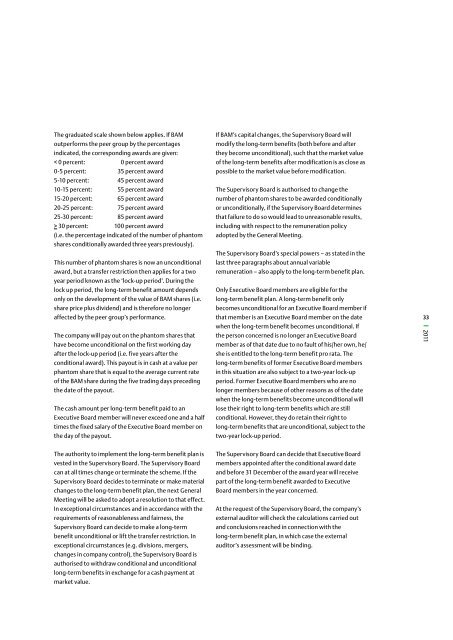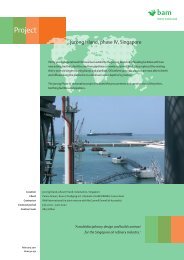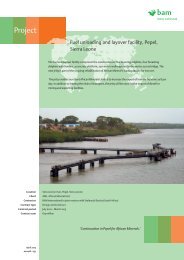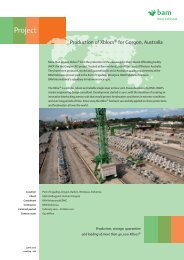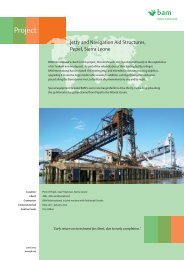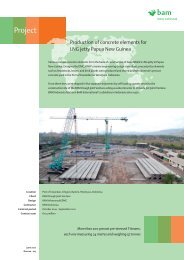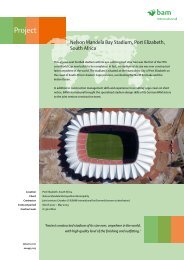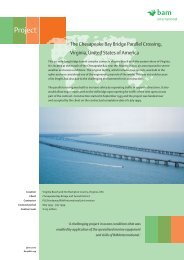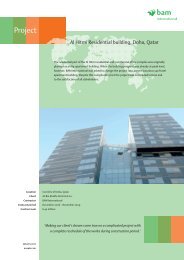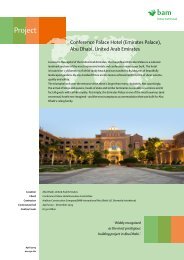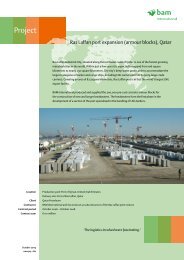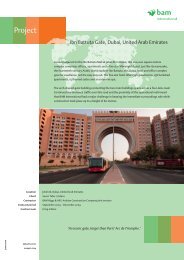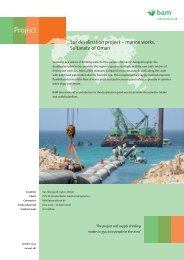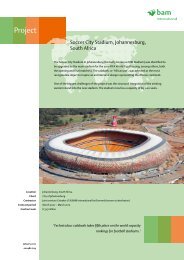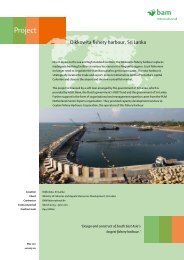BAM Abbreviated Annual Report 2011 - Siteseeing in the world of ...
BAM Abbreviated Annual Report 2011 - Siteseeing in the world of ...
BAM Abbreviated Annual Report 2011 - Siteseeing in the world of ...
You also want an ePaper? Increase the reach of your titles
YUMPU automatically turns print PDFs into web optimized ePapers that Google loves.
The graduated scale shown below applies. If <strong>BAM</strong><br />
outperforms <strong>the</strong> peer group by <strong>the</strong> percentages<br />
<strong>in</strong>dicated, <strong>the</strong> correspond<strong>in</strong>g awards are given:<br />
< 0 percent: 0 percent award<br />
0-5 percent: 35 percent award<br />
5-10 percent: 45 percent award<br />
10-15 percent: 55 percent award<br />
15-20 percent: 65 percent award<br />
20-25 percent: 75 percent award<br />
25-30 percent: 85 percent award<br />
> 30 percent: 100 percent award<br />
(i.e. <strong>the</strong> percentage <strong>in</strong>dicated <strong>of</strong> <strong>the</strong> number <strong>of</strong> phantom<br />
shares conditionally awarded three years previously).<br />
This number <strong>of</strong> phantom shares is now an unconditional<br />
award, but a transfer restriction <strong>the</strong>n applies for a two<br />
year period known as <strong>the</strong> ‘lock-up period’. Dur<strong>in</strong>g <strong>the</strong><br />
lock up period, <strong>the</strong> long-term benefit amount depends<br />
only on <strong>the</strong> development <strong>of</strong> <strong>the</strong> value <strong>of</strong> <strong>BAM</strong> shares (i.e.<br />
share price plus dividend) and is <strong>the</strong>refore no longer<br />
affected by <strong>the</strong> peer group’s performance.<br />
The company will pay out on <strong>the</strong> phantom shares that<br />
have become unconditional on <strong>the</strong> first work<strong>in</strong>g day<br />
after <strong>the</strong> lock-up period (i.e. five years after <strong>the</strong><br />
conditional award). This payout is <strong>in</strong> cash at a value per<br />
phantom share that is equal to <strong>the</strong> average current rate<br />
<strong>of</strong> <strong>the</strong> <strong>BAM</strong> share dur<strong>in</strong>g <strong>the</strong> five trad<strong>in</strong>g days preced<strong>in</strong>g<br />
<strong>the</strong> date <strong>of</strong> <strong>the</strong> payout.<br />
The cash amount per long-term benefit paid to an<br />
Executive Board member will never exceed one and a half<br />
times <strong>the</strong> fixed salary <strong>of</strong> <strong>the</strong> Executive Board member on<br />
<strong>the</strong> day <strong>of</strong> <strong>the</strong> payout.<br />
The authority to implement <strong>the</strong> long-term benefit plan is<br />
vested <strong>in</strong> <strong>the</strong> Supervisory Board. The Supervisory Board<br />
can at all times change or term<strong>in</strong>ate <strong>the</strong> scheme. If <strong>the</strong><br />
Supervisory Board decides to term<strong>in</strong>ate or make material<br />
changes to <strong>the</strong> long-term benefit plan, <strong>the</strong> next General<br />
Meet<strong>in</strong>g will be asked to adopt a resolution to that effect.<br />
In exceptional circumstances and <strong>in</strong> accordance with <strong>the</strong><br />
requirements <strong>of</strong> reasonableness and fairness, <strong>the</strong><br />
Supervisory Board can decide to make a long-term<br />
benefit unconditional or lift <strong>the</strong> transfer restriction. In<br />
exceptional circumstances (e.g. divisions, mergers,<br />
changes <strong>in</strong> company control), <strong>the</strong> Supervisory Board is<br />
authorised to withdraw conditional and unconditional<br />
long-term benefits <strong>in</strong> exchange for a cash payment at<br />
market value.<br />
If <strong>BAM</strong>’s capital changes, <strong>the</strong> Supervisory Board will<br />
modify <strong>the</strong> long-term benefits (both before and after<br />
<strong>the</strong>y become unconditional), such that <strong>the</strong> market value<br />
<strong>of</strong> <strong>the</strong> long-term benefits after modification is as close as<br />
possible to <strong>the</strong> market value before modification.<br />
The Supervisory Board is authorised to change <strong>the</strong><br />
number <strong>of</strong> phantom shares to be awarded conditionally<br />
or unconditionally, if <strong>the</strong> Supervisory Board determ<strong>in</strong>es<br />
that failure to do so would lead to unreasonable results,<br />
<strong>in</strong>clud<strong>in</strong>g with respect to <strong>the</strong> remuneration policy<br />
adopted by <strong>the</strong> General Meet<strong>in</strong>g.<br />
The Supervisory Board’s special powers – as stated <strong>in</strong> <strong>the</strong><br />
last three paragraphs about annual variable<br />
remuneration – also apply to <strong>the</strong> long-term benefit plan.<br />
Only Executive Board members are eligible for <strong>the</strong><br />
long-term benefit plan. A long-term benefit only<br />
becomes unconditional for an Executive Board member if<br />
that member is an Executive Board member on <strong>the</strong> date<br />
when <strong>the</strong> long-term benefit becomes unconditional. If<br />
<strong>the</strong> person concerned is no longer an Executive Board<br />
member as <strong>of</strong> that date due to no fault <strong>of</strong> his/her own, he/<br />
she is entitled to <strong>the</strong> long-term benefit pro rata. The<br />
long-term benefits <strong>of</strong> former Executive Board members<br />
<strong>in</strong> this situation are also subject to a two-year lock-up<br />
period. Former Executive Board members who are no<br />
longer members because <strong>of</strong> o<strong>the</strong>r reasons as <strong>of</strong> <strong>the</strong> date<br />
when <strong>the</strong> long-term benefits become unconditional will<br />
lose <strong>the</strong>ir right to long-term benefits which are still<br />
conditional. However, <strong>the</strong>y do reta<strong>in</strong> <strong>the</strong>ir right to<br />
long-term benefits that are unconditional, subject to <strong>the</strong><br />
two-year lock-up period.<br />
The Supervisory Board can decide that Executive Board<br />
members appo<strong>in</strong>ted after <strong>the</strong> conditional award date<br />
and before 31 December <strong>of</strong> <strong>the</strong> award year will receive<br />
part <strong>of</strong> <strong>the</strong> long-term benefit awarded to Executive<br />
Board members <strong>in</strong> <strong>the</strong> year concerned.<br />
At <strong>the</strong> request <strong>of</strong> <strong>the</strong> Supervisory Board, <strong>the</strong> company’s<br />
external auditor will check <strong>the</strong> calculations carried out<br />
and conclusions reached <strong>in</strong> connection with <strong>the</strong><br />
long-term benefit plan, <strong>in</strong> which case <strong>the</strong> external<br />
auditor’s assessment will be b<strong>in</strong>d<strong>in</strong>g.<br />
33<br />
<strong>2011</strong>


